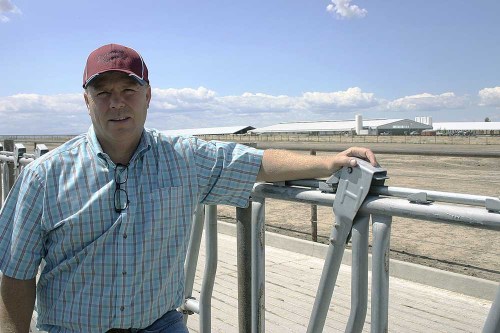Easterday pleads guilty to $244 million ghost-cattle scam
Published 4:19 pm Wednesday, March 31, 2021
MESA, Wash. — A Washington man pleaded guilty on Wednesday, March 31, to defrauding businesses out of more than $244 million by charging them under various agreements for the purported costs of purchasing and feeding hundreds of thousands of cattle that did not actually exist, according to a press release from the U.S. Attorney’s Office.
According to court documents, Cody Easterday, 49, of Mesa, Washington, used his company, Easterday Ranches, to enter into a series of agreements with Tyson Foods and an unnamed second business to purchase and feed cattle on behalf of Tyson.
Trending
“For years, Cody Easterday perpetrated a fraud scheme on a massive scale, increasing the cost of producing food for American families,” said Acting Assistant Attorney General Nicholas L. McQuaid of the Justice Department’s Criminal Division. “The criminal division’s prosecutors are committed to swiftly and thoroughly prosecuting frauds affecting our nation’s agricultural and other commodities markets, whether in the heartland or on Wall Street.”
Per the agreements, Tyson and the unnamed business would advance Easterday Ranches the costs of buying and raising the cattle. Once the cattle were slaughtered and sold at market price, Easterday Ranches would repay the costs advanced — plus interest and certain other costs — retaining as profit the amount by which the sale price exceeded the repayment to both Tyson and the unnamed business.
Easterday submitted and caused others to submit fraudulent invoices and other information to both Tyson and the unnamed business starting in 2016 and continuing through November 2020.
The false invoices sought and obtained reimbursement from the victims for the purported costs of purchasing and growing hundreds of thousands of cattle that neither Easterday nor Easterday Ranches ever purchased and that did not actually exist, the press release said.
The press release said Easterday constructed the fraud in order to offset more than $200 million in losses incurred in the commodities trading markets.
In connection with his commodity futures trading, Easterday also defrauded the CME Group, which operates the world’s largest financial derivatives exchange. On two separate occasions, the press release said, Easterday submitted falsified paperwork to the CME that resulted in the company exempting Easterday Ranches from otherwise-applicable position limits in live cattle futures contracts.
Trending
“I commend the agents with the Federal Deposit Insurance Company Office of the Inspector General and the U.S. Postal Inspection Service for their dedication to investigating this case and tenacity in ferreting out the fraudulent activity to which the defendant has pleaded guilty,” said Acting U.S. Attorney Joseph H. Harrington for the Eastern District of Washington.
Easterday pleaded guilty to one count of wire fraud and agreed to repay $244 million in restitution. He is scheduled to be sentenced on Wednesday, Aug. 4, and faces a maximum penalty of 20 years in prison. A federal district court judge will determine any sentence after considering the U.S. Sentencing Guidelines and other statutory factors.
Tyson Foods is the world’s second-largest processor and marketer of chicken, beef and pork. The company does not own or operate feedlots, but employs buyers in beef-producing areas who visit independent feed yards and public auctions to buy animals for its processing plants — including one near Pasco, which Easterday Ranches supplied.
Tyson entered into a cattle feeding agreement with Easterday Ranches in 2017. In a filing with the U.S. Securities and Exchange Commission, Tyson reported that Easterday provided roughly 2% of the company’s beef during the last four fiscal years.
Gary Mickelson, senior director of public relations for Tyson, said in January the company became aware of fraud during a recent company-led inspection.
“As we disclosed in December, this misappropriation of funds has cost Tyson more than $200 million, which the company is working to recoup,” Mickelson said. “We are also working with our outside auditor to implement additional financial controls to help prevent or detect this type of activity in the future.”
Easterday Farms, part of the family’s multi-pronged agricultural operation, is working to revive Oregon’s second-largest dairy, the former Lost Valley Farm near Boardman. The family registered a new business in Oregon, called Easterday Dairy LLC, which is now seeking state approval to reopen the dairy in rural Morrow County with up to 28,300 total cattle.
In a February statement to the Capital Press, Cole Easterday, one of the owners of Easterday Dairy, said the company is still working to secure a Confined Animal Feeding Operation, or CAFO, permit from the Oregon Department of Agriculture and Department of Environmental Quality to reopen the dairy near Boardman.
“Though the situation with Easterday Ranches and Easterday Farms is unfortunate, Easterday Dairy LLC’s commitment to our current CAFO permit and our permit application is unchanged,” he said.










